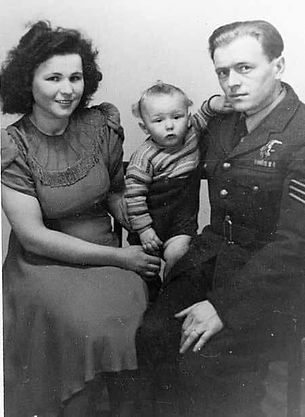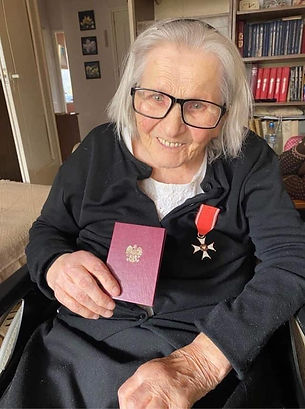
Wladyslawa KONDRACKA
Reserve Second Lieutenant Władysława Kondracka (nee Grębowiec) said: ”My name is Władysława Kondracka, I am the daughter of Szczepan and Katarzyna Grębowiec, I was born on March 25, 1925.
On February 10, 1940, in the early morning, uniformed Russian soldiers woke us up, we were ordered to pack the necessary things within only 1 hour. Loaded on a sleigh, we started our exile's journey deep into Russia to the town of Tojma in the province. Arkhangelsk.
We were taken to the railway station and loaded into cattle cars with 50-60 other people. This included infants, toddlers, children, teens, adults, and seniors. Most of the adults and seniors were women. The cattle car had two shelves at either end, where people could sit or sleep – the rest had to make do with the floor. There was a cast iron stove, but they soon ran our of wood to fuel it. There was also a hole in the floor that served as a toilet.
They travelled like this for 3 weeks, and were given some water, stale bread, and watery soup, only a few times. When someone died, their bodies were cast out next to the tracks and left there. Many infants and elders did not survive this journey.
The first episode of exile to Siberia was the village of Kotłas.
When we reached the work camp in Siberia, we were told that this is where we would eventually die there, but in the meantime, we had to work in order to earn their daily ration of bread. Children as young as 13 were set to work in the forests – cutting branches from the trees that had been cut down.
In June 1941, Germany turned on its ally, Russia. Stalin then quickly changed tactics and allied himself with the west so that the allies could help him defeat the Germans. This led to the signing of the Sikorski-Majewski agreement that called for the freeing of Poles imprisoned in POW camps and labour camps in the USSR, and the formation of a Polish Army in the southern USSR.
In July 1942 we joined the army from Siberia to Tashkent.
In September 1942 we got to Krasnowodzk, from where we were transported by barges to Pahlewi. We were moved to Tehran, and after a month, through the AHwaz mountains, we were taken to Karachi, India, from where we sailed through the Persian Gulf to Mombasa in Africa.
I left Tehran on May 28, 1943, heading forf Uganda. After a two-day journey by train, we found ourselves on the Nile, and after another 2 days of travelling on the Nile in barges, we reached town of Masindi, Uganda.
in 1943, I volunteered for the Polish Air Force in the UK - to the Women's Auxiliary Air Force (WAAF). And so, I entered a new chapter in my life, I left my family and went to England with other girls who had also volunteered. The road led along the Nile to Mombasa, and there, together with soldiers of various nationalities, we boarded a very large ship "Isle de France". We were told that we were about 10,000 in all. We went via Durban, and around Africa. And after 45 days we reached England.
The boat trip was not pleasant. On the contrary, it was 45 days in terrible conditions that you want to forget for the rest of your life.
As a RAF member, I was assigned to a 3-month military training and a language course: English.
After completing the courses and passing the exam with a very good result, I was assigned to the Preliminary Pilot Training Centre in Hucknall near Nottingham, where I was in constant combat readiness to fulfill the obligations set out in the order log when servicing the 300 Polish Bomber Squadron air craft.
The base at Hucknall included; airport, hangars, hospital, and kitchen. Polish WAAFs were assigned to work with English girls to gain practice in the use of English.
There I met my husband, Stanisław Kondracki, who was a radio operator for 300 Squadron. He was a great man, sang beautifully, danced wonderfully and was full of hope and longing in his heart for his family, for Poland, just like me.This acquaintance turned into true love, and the fruit of this love was the birth of Ryszard our son in 1946 at the Workshop in Nottinghamshire.
After the end of the war, the information that we received was not very optimistic. We heard voices that Poland was in ruins under Russian occupation, so when we had the option of going to America, Canada, Australia or staying in England, we decided to go to Australia.
But we missed our country and, in June, 1947, we returned to Poland, to Jarosław, where the beginnings were very difficult and very unpleasant for us. Security Service employees suggested we return to England and do espionage work for the the Polish People's Authority. When my husband did not agree to cooperate, provocations began. There were great difficulties in finding a job, but it did not discourage us too much, because Jarosław was the end of our wandering, long journey to our country.
This was our home, here we had our family, and despite the fact that we lived in poverty, and sometimes even in a extreme poverty, we were happy that I did not have to cook soup made of tree bark or potato shells, and the bread crust is sacred to this day.
----
In 1991, Władysława Kondracka (Aircraftwoman 2 (ACW2)) was awarded the Cross of Combat Action in the West by the President of the Republic of Poland, and in 2001 she was promoted to the rank of officer - second lieutenant in the reserve. The war wandering for Władysława began when she was 15 years old. She returned to Poland after 7 years in 1947. She is still with us …



Photographs from family collection
Source: Ryszard Kondracki, Ksiega Kresowian, Stowarzyszenie Dziedzictwo Kresow
Translated here from the original Polish
Copyright: Kondracki family
.